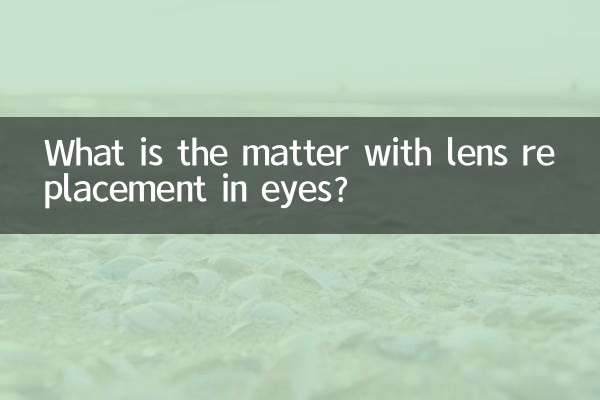What is the matter with lens replacement in eyes?
In recent years, with the advancement of medical technology, "eye lens replacement" in eye surgery has become a hot topic. Many people are curious about this technology, especially cataract patients and people with high myopia. This article will provide a detailed explanation of the principle, applicable groups, surgical risks and recent hot topics of "eye lens replacement", and attach the hot topic data of the entire network in the past 10 days for reference.
1. What is eye lens replacement?

Eye lens replacement, medically known as "intraocular lens implantation", is a process of surgically replacing the natural lens in the eye with an artificial lens. It is mainly used to treat refractive problems such as cataracts, high myopia or hyperopia. According to different functions, intraocular lenses can be divided into single focus, multifocal and astigmatism correction types.
| Crystal type | Applicable people | Features |
|---|---|---|
| single focus crystal | Common cataract patients | Can only see clearly at a fixed distance |
| multifocal crystal | Hope to get rid of the reading glasses crowd | Can see far and near at the same time |
| Astigmatism correcting crystals | Patients with corneal astigmatism | Built-in astigmatism correction function |
2. Inventory of recent hot topics (last 10 days)
Through the analysis of the entire network data, the following is the recent hot content related to "eye lens replacement":
| topic | heat index | Main discussion platform |
|---|---|---|
| Cataract surgery included in medical insurance reimbursement | 85 | Weibo, Zhihu |
| Comparison of ICL surgery for high myopia | 78 | Xiaohongshu, Bilibili |
| Intraocular lens lifespan | 72 | Douyin, Baidu Tieba |
| How to solve glare after surgery | 65 | Professional medical forum |
3. Applicable groups and risks of surgery
1.Applicable people:
- Patients with age-related cataracts
- People with myopia exceeding 1000 degrees and thin cornea
- Middle-aged and elderly people who have high requirements for vision quality
2.surgical risks:
- Postoperative infection (incidence rate is about 0.1%)
- Intraocular lens displacement (rare)
- Glare at night (more common with multifocal crystals)
It is worth noting that discussions about "postoperative glare" have increased significantly on social platforms recently. Many bloggers shared their personal experiences and suggested that those with strong driving needs at night choose multifocal lenses with caution.
4. New technological progress and price reference
The latest technology in 2023 has been implemented:
- Laser-assisted crystal replacement
- Adjustable focus crystal
- Blue light filtering crystal
| Surgery type | Reference price (yuan) | recovery cycle |
|---|---|---|
| Ordinary single focus | 8000-15000 | 1 week |
| Imported multi-focus | 25000-40000 | 2-4 weeks |
| Astigmatism correction type | 18000-30000 | 2-3 weeks |
5. Five issues that patients are most concerned about
According to recent data from online question and answer platforms:
1. Will the surgery be painful? (No pain under general anesthesia/local anesthesia)
2. Do crystals need to be replaced regularly? (Usually for lifetime use)
3. How long will it take to resume normal use of eyes after surgery? (Basically recovered in 3-7 days)
4. Can presbyopia be solved at the same time? (Multifocal crystals are available)
5. How much can medical insurance reimburse? (Policies vary from place to place, basic crystals can usually be reported)
6. Expert advice
Ophthalmologists emphasized in recent interviews:
- A comprehensive fundus examination is required before surgery
- Choose the appropriate lens according to your eye needs
- Strictly follow the doctor’s instructions for medication after surgery
-Regular review and monitoring of intraocular pressure
As the population ages, the number of cataract surgeries is expected to increase by 30% in the next five years. At the same time, more young people are beginning to pay attention to refractive lens replacement surgery, which will become a new growth point in the field of ophthalmology.

check the details

check the details